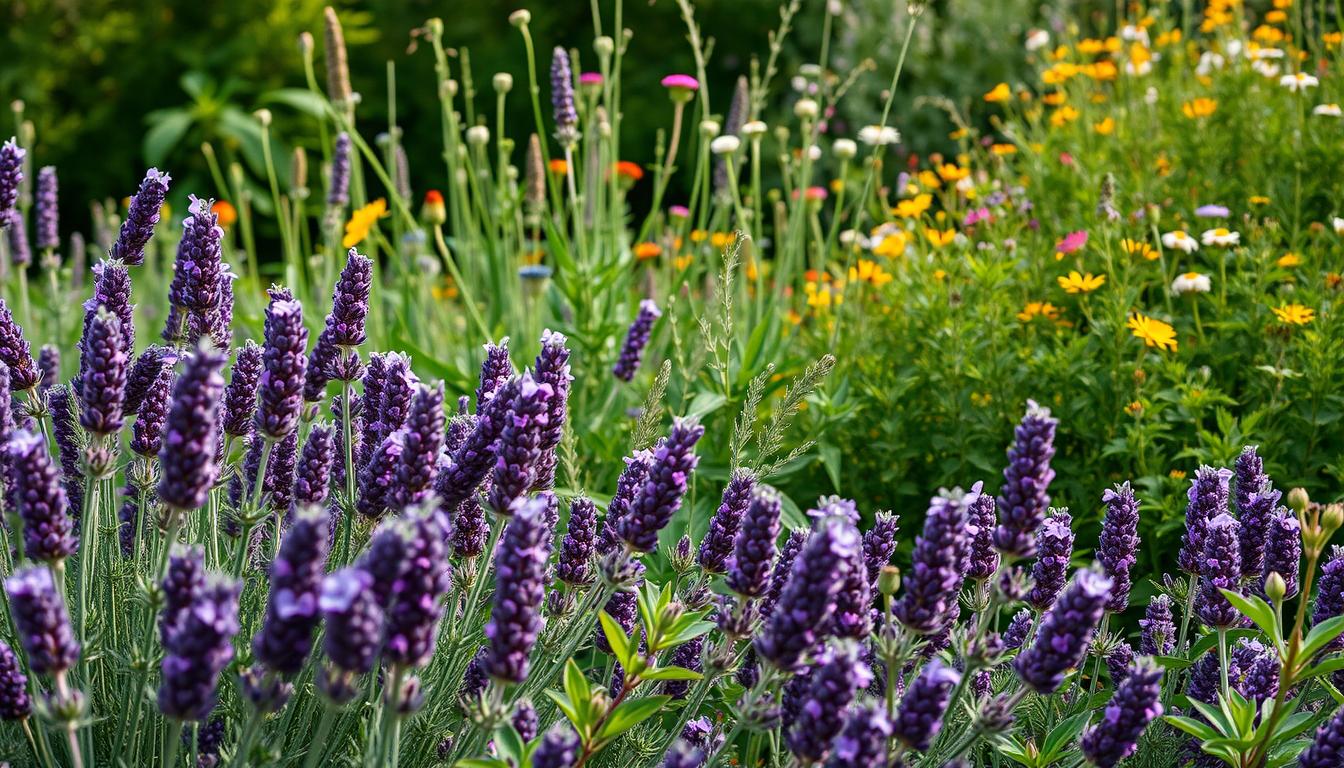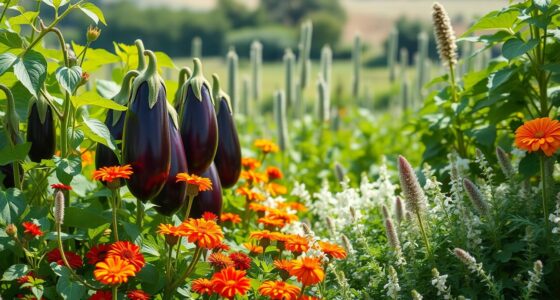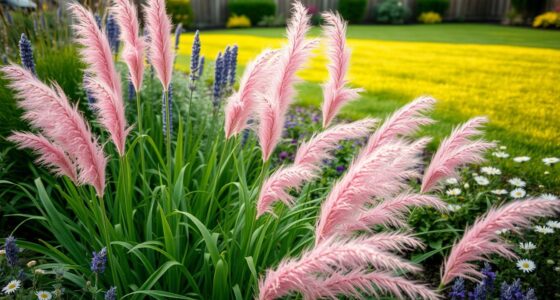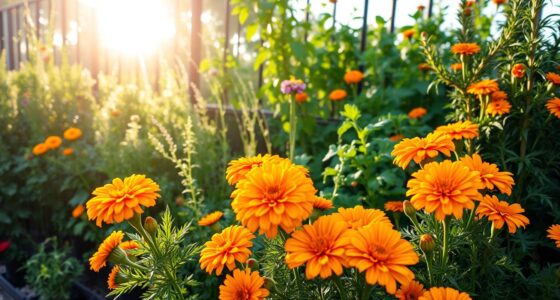Imagine stepping into your garden and being greeted by the vibrant colors and fragrant aromas of fresh fruits and herbs beckoning you closer. Raspberries, with their luscious sweetness and adaptability, can become a highlight of your gardening journey. As you savor the fruits of your labor, have you ever considered how companion planting can enhance your raspberry crop? By choosing the right companion plants for raspberries, not only can you boost their yield but also create a thriving ecosystem that supports your garden’s health. In this article, we’ll explore the best companion plants for raspberries and how raspberry companion planting can turn your garden into a flourishing paradise.
Key Takeaways
- Companion plants for raspberries can deter pests and improve plant health.
- Choosing the right companions enhances the flavor and yield of your raspberries.
- Creating a diverse garden ecosystem supports overall growth and sustainability.
- Understanding plant combinations is vital to achieving successful raspberry cultivation.
- Seasonal considerations and spacing are essential for effective companion planting.
Why Choose Companion Plants for Raspberries?
Engaging in companion planting yields numerous benefits for your raspberry garden. Embracing this technique fosters relationships between various plant species that promote their growth. By selecting the right raspberry garden companions, you can create an environment that enhances both crop yield and flavor. This not only leads to healthier plants but also contributes to a more dynamic ecosystem within your garden.
Benefits of Companion Planting
Utilizing companion plants can help in various ways. Here are some key advantages:
- Deter pests naturally, reducing the reliance on chemical pesticides.
- Encourage beneficial insects, which improve pollination.
- Enhance the nutritional content of the soil through natural amendments.
- Suppress weed growth, allowing your raspberry plants to thrive.
Enhancing Growth and Flavor
Incorporating the best plants to grow with raspberries can significantly improve the quality and taste of your harvest. Companion plants may share nutrients or provide shade and support, thus securing the raspberry plants’ health and productivity. This collaborative planting approach focuses on plant varieties that complement each other, ensuring that your raspberries not only flourish but taste delicious too.
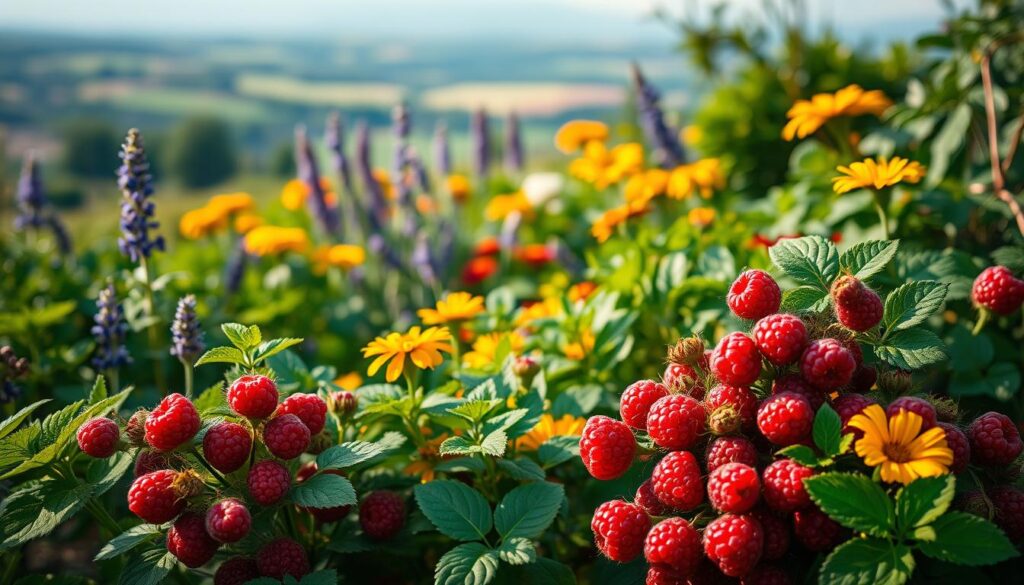
Ideal Companion Plants for Raspberries
When you consider growing raspberries, choosing the right raspberry plant companions can significantly enhance their growth and flavor. Fostering healthy relationships with companion plants offers a host of benefits. Two of the most popular raspberry garden buddies stand out for their unique contributions: marigolds and basil.
Marigolds: Natural Pest Deterrents
Marigolds are a stellar choice for planting alongside raspberries. Their vibrant blooms not only add beauty to your garden but serve as effective natural pest deterrents. These flowers are known to repel harmful pests such as Japanese beetles while simultaneously attracting beneficial insects like bees. This dual action fosters better pollination of your raspberry plants, ensuring fruitful yields.
Basil: Flavor Enhancer and Companion
Basil is another fantastic addition to your raspberry garden. This herb not only elevates the flavor profile of your raspberry harvest but also works to repel undesirable insects. Growing basil near raspberries creates a mutually beneficial environment, improving both the taste of the fruit and the health of your plants. By incorporating these two plants, you cultivate a flourishing ecosystem that enriches your gardening experience.
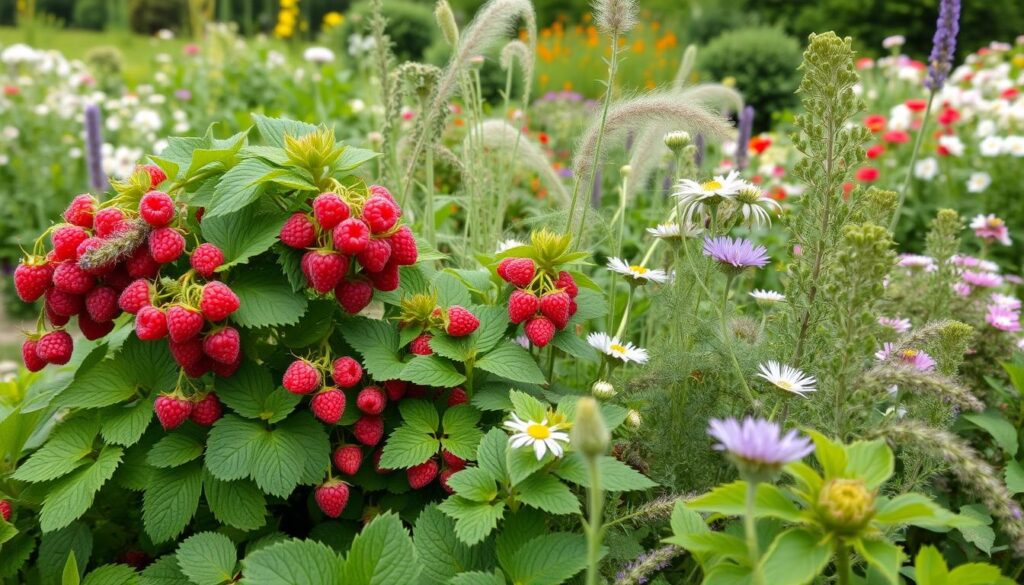
Vegetables That Pair Well with Raspberries
In your quest for thriving raspberries, understanding the right vegetable companions can make a substantial difference. The harmony between vegetables and raspberry plants can significantly enhance their growth, while also providing natural pest resistance. This raspberry companion planting guide highlights two exceptional options that serve as beneficial raspberry plant neighbors: onions and garlic.
Onion: Aroma to Repel Pests
Onions not only add flavor to your meals but also serve an important purpose in the garden. Their potent aroma deters many pests, including aphids and other common nuisances that threaten raspberry canes. By incorporating onions into your planting scheme, you create a barrier against unwanted insects, allowing your raspberries to flourish.
Garlic: Natural Insecticide
Garlic is another fantastic vegetable to consider when planting alongside raspberries. Known for its strong anti-fungal properties, garlic can help combat diseases like verticillium wilt, which can afflict raspberry plants. Utilizing garlic as a companion can safeguard the health of your garden, ensuring a robust raspberry harvest.
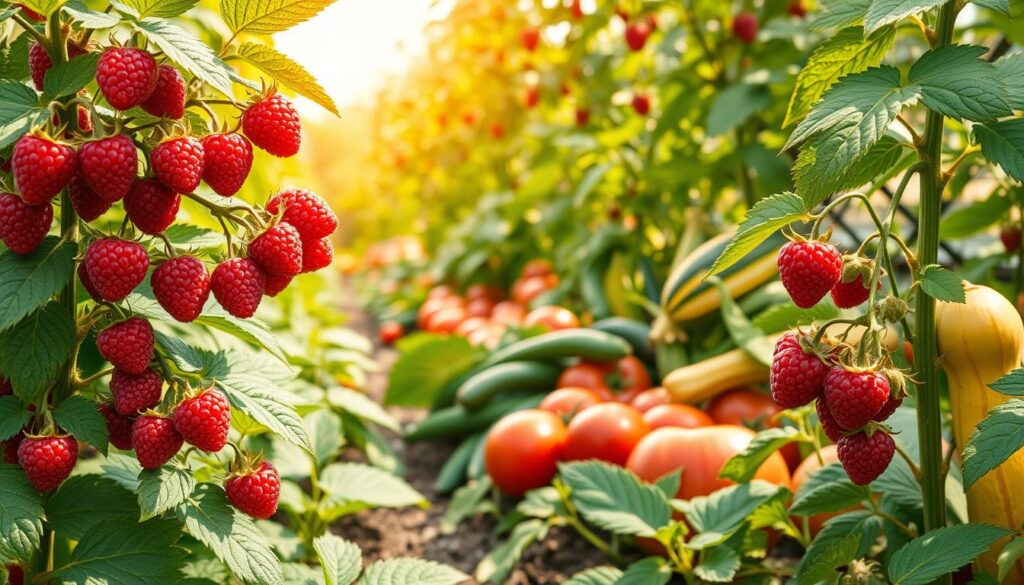
| Vegetable | Benefits for Raspberries | Pest Resistance |
|---|---|---|
| Onion | Enhances growth and flavor | Repels aphids and beetles |
| Garlic | Fights fungal diseases | Attacks various pests |
By strategically incorporating onions and garlic into your raspberry patch, you enrich your garden ecosystem. Utilizing this raspberry companion planting guide can maximize the health and productivity of your raspberry plant neighbors.
Herbs That Benefit Raspberry Growth
Incorporating specific herbs into your raspberry garden can enhance both growth and productivity. Certain raspberry plant companion species provide unique benefits that promote overall health and flavor for your berries. Two standout herbs include chamomile and mint, each with distinct advantages.
Chamomile: Health Booster for Plants
Chamomile serves as an excellent addition to your garden, as it attracts beneficial insects that can help with pest control. This flowering herb also improves soil quality by adding nutrients, which can lead to healthier raspberry plants. You may notice that raspberries grown alongside chamomile often exhibit enhanced flavor profiles, making them a delightful choice for complementing your berry patch.
Mint: Pest Protection and Flavor
Mint stands out among companion plants for raspberries due to its strong aroma, which helps deter pests like aphids. Beyond its protective qualities, mint can enhance the overall flavor of raspberries, providing a refreshing twist. This herb is easy to grow and can coexist harmoniously in your garden, ensuring both aesthetic appeal and functional benefits.
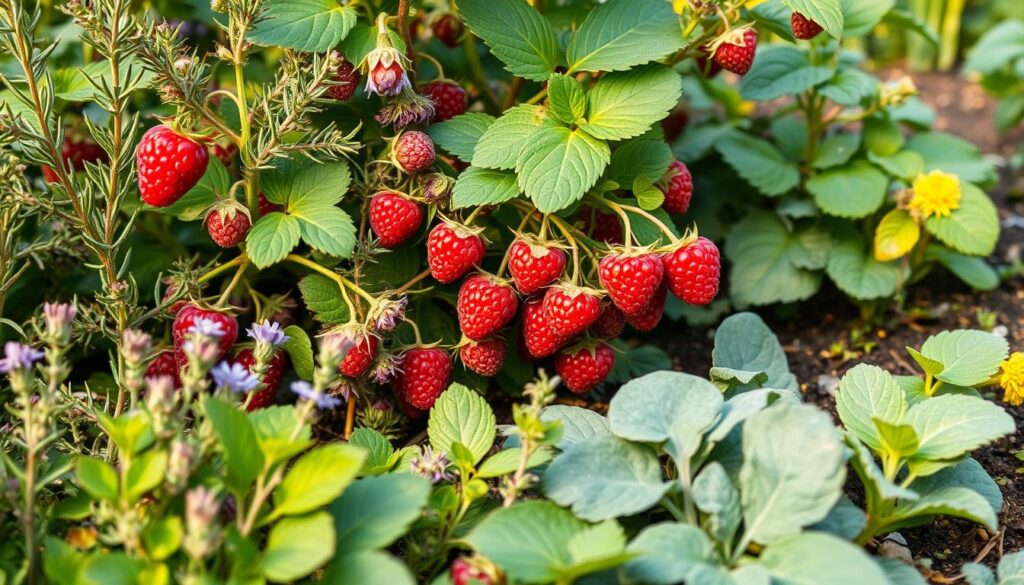
Fruits That Thrive Alongside Raspberries
Integrating fruits into your raspberry garden creates an abundance of flavors and croppings. To maximize productivity and health, consider beneficial partners like strawberries and blueberries, which can serve as excellent raspberry garden companions. Each of these fruits brings unique benefits, enriching your garden and yielding delicious produce.
Strawberries: Beneficial Neighbors
Strawberries are an ideal choice as raspberry plant companions. Both thrive in well-drained, slightly acidic soil, allowing for successful co-cultivation. The close proximity can help with pest management, as the strong growth habits of strawberries deter certain pests that may affect raspberries. You can enjoy a bountiful harvest while simplifying maintenance.
Blueberries: Similar Growing Conditions
Blueberries also flourish in conditions akin to those preferred by raspberries. Planting them together not only diversifies your fruit yield but nurtures a healthy ecosystem where both can thrive. Given their similar needs for soil and maintenance, the combination promotes efficiency in gardening practices. Ensuring adequate spacing can help mitigate potential disease spread, allowing you to enjoy both fruits safely.
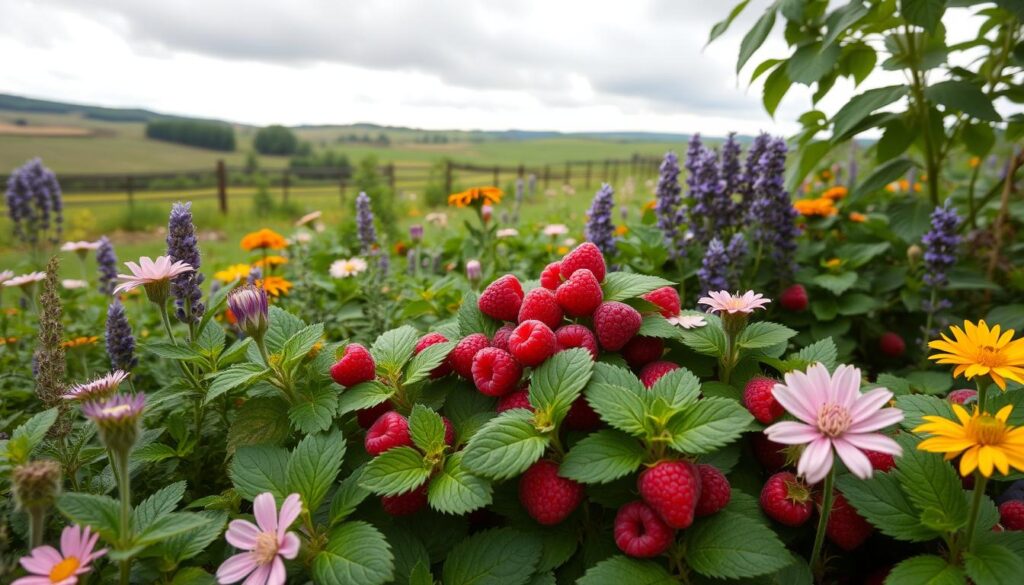
| Fruit | Growing Conditions | Benefits as Companions |
|---|---|---|
| Strawberries | Well-drained, slightly acidic soil | Pest deterrence, compatible growth |
| Blueberries | Similar soil and water requirements | Diverse yield, healthy ecosystem |
Choosing strawberries and blueberries as raspberry garden companions can elevate your gardening experience, creating a flavorful and productive landscape. With a bit of care in maintaining soil health and spacing, these fruits can thrive harmoniously alongside your raspberries.
The Role of Flowers in Raspberry Cultivation
Integrating flowers into your raspberry garden enhances not just the aesthetic appeal but also the overall health of your plants. Flowers attract essential pollinators such as bees and butterflies, which play a vital role in fruit set. By choosing the right flowers, you can create an environment that supports raspberry companion planting and contributes to a thriving ecosystem.
Pollinator Attraction
Flowers like lavender and nasturtiums are excellent choices for attracting pollinators. These vibrant blooms not only provide visual beauty but also entice the insects needed for successful pollination. Bees, a key player in raspberry cultivation, are drawn in by the scent and color of these flowers, ensuring that your berry plants receive the cross-pollination necessary for optimal fruit production.
Creating a Diverse Ecosystem
Establishing a diverse ecosystem in your raspberry garden has many benefits. By planting a variety of flowers, you can create habitats for beneficial insects, which help manage pest populations naturally. This biodiversity leads to healthier plants and better yields. The inclusion of various flowers enhances your raspberry companion planting strategy, fostering a balance in your garden that supports both plants and insects.
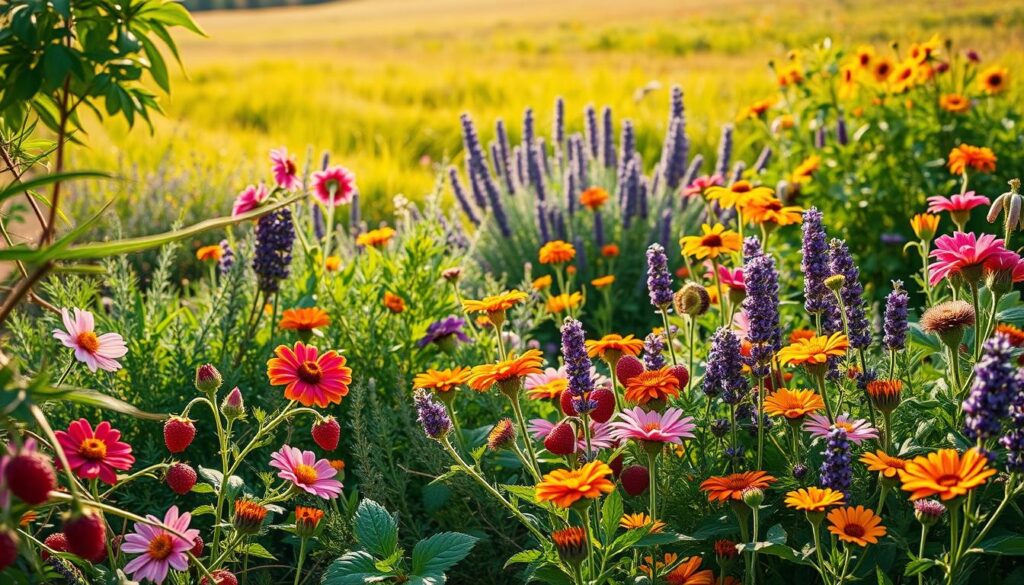
Understanding Planting Combinations
When setting up your raspberry garden, comprehension of planting combinations plays a vital role in achieving success. Selecting the best plants to grow with raspberries can enhance their health, yield, and flavor, while improper pairings may cause setbacks. Learning from both success and failure stories can guide you toward creating a flourishing garden ecosystem.
Success and Failure Stories
Many gardeners have discovered the advantages of planting raspberry garden buddies that support growth and repel pests. For instance, marigolds are often hailed as excellent companions for their ability to deter harmful insects. On the other hand, tales of challenges arise when planting raspberries alongside nightshades, which have been known to introduce diseases such as verticillium wilt. Documenting and learning from these experiences enables you to make informed decisions in your garden.
Avoiding Bad Companions
Identifying plants that can negatively impact raspberry growth is crucial. Some common offenders include tomatoes and potatoes, which belong to the same family as raspberries and may attract harmful pests. Consider researching potential raspberry garden buddies and steering clear of those that can lead to complications. Taking note of proven pairings fosters a thriving environment for your raspberries and promotes greater harvests.
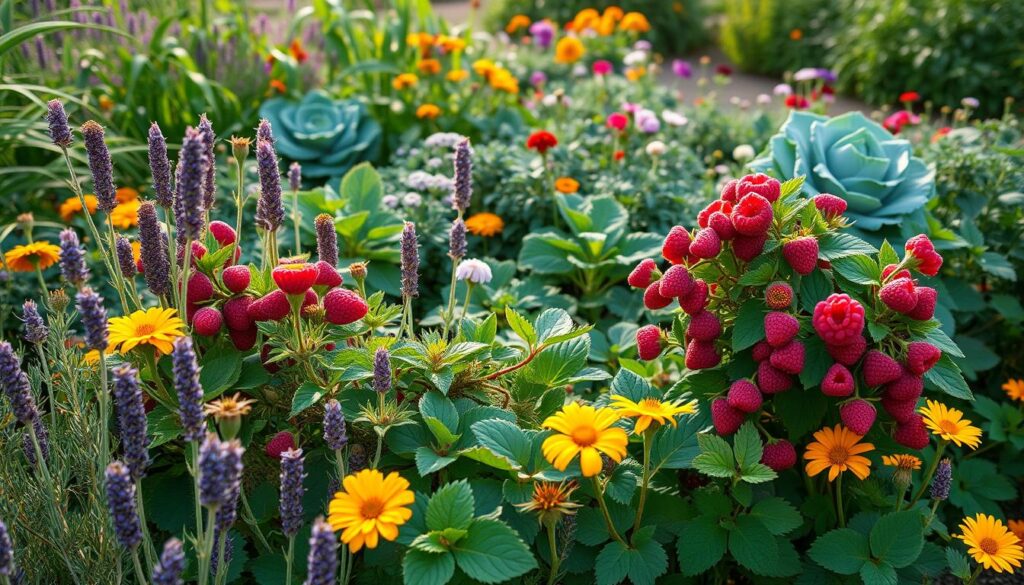
With careful planning and understanding of these planting combinations, your raspberry garden can flourish and yield delicious fruits. Embrace a trial-and-error approach and always seek knowledge, as each gardening season offers new insights into the best plants to grow with raspberries.
Soil and Nutrient Considerations
The health of your raspberry plants greatly depends on the quality of the soil they grow in. Utilizing techniques from the raspberry companion planting guide can enhance soil health and fertility, leading to improved plant performance. By selecting the right companion plants, you can create a thriving environment that benefits not only raspberries but also the entire garden ecosystem.
Companion Plant Effects on Soil Health
Companion plants play a significant role in improving soil health. Some plants contribute beneficial microorganisms, while others enhance soil structure. Legumes, such as peas and beans, have the unique ability to fix nitrogen, enriching the soil’s nutrient profile. This process is vital for your raspberry plants, as they thrive in nitrogen-rich soil. Cover crops can further aid in preventing erosion and maintaining moisture levels, ensuring that your garden remains productive throughout the growing season.
Fertilization Tips for Raspberry Gardens
Regular fertilization is essential for robust raspberry growth. You can incorporate compost or well-rotted manure to provide a steady supply of nutrients. Consider applying organic fertilizers during key growth stages, such as flowering or fruiting, to support your raspberries. Keep in mind that over-fertilization can harm the plants, so observe their needs closely and adjust your approach according to their growth stages. Following the raspberry companion planting guide can help in choosing the right mix of plants that not only flourish together but also contribute positively to soil health.
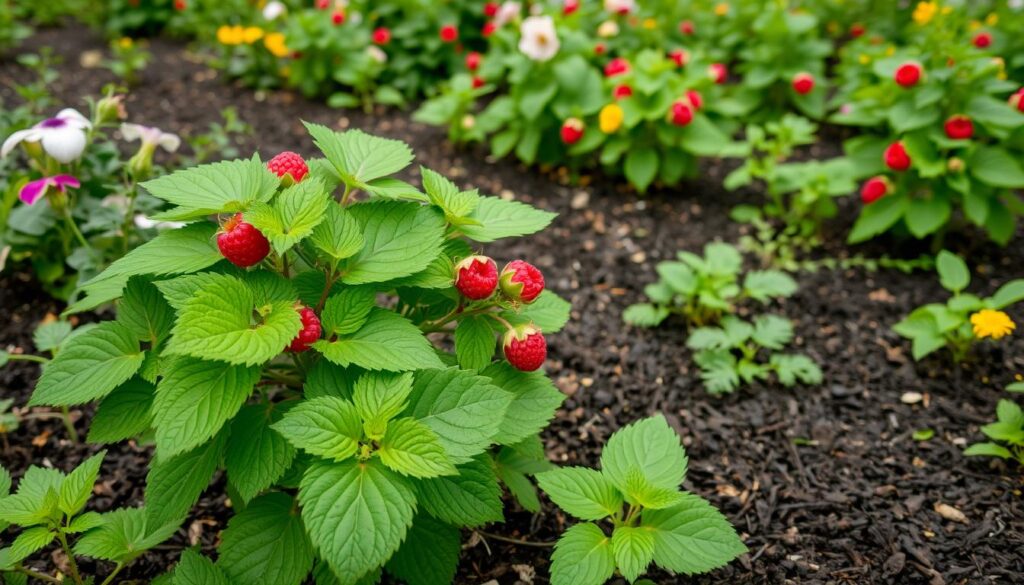
Seasonal Considerations When Planting
Timing is crucial for successful companion planting in your raspberry garden. Understanding the best times to sow your raspberry garden companions can greatly enhance the health and yield of your raspberry plants. Seasonal changes affect not only the growth patterns of raspberry plant neighbors but also your gardening practices. With that in mind, let’s explore how to optimally schedule your planting and maintenance tasks.
Timing Your Companion Planting
Spring marks the ideal time to sow fast-growing raspberry garden companions such as marigolds and basil. These plants help deter pests and enhance the flavor of your raspberries. Late summer is perfect for planting cover crops, which can improve soil health and prepare it for the following season’s raspberry growth. Monitoring weather conditions will also aid in ensuring your raspberry plant neighbors thrive effectively through each season.
Seasonal Maintenance Tips
During the growing season, regular maintenance is key. Pruning your raspberry plants encourages healthy growth and prevents overcrowding. Checking for pests periodically keeps your crops safe from damage and ensures a bountiful harvest. Invest time in nurturing your raspberry garden companions, as their health directly influences your raspberry yields. Keeping an organized schedule will help you manage these tasks efficiently.
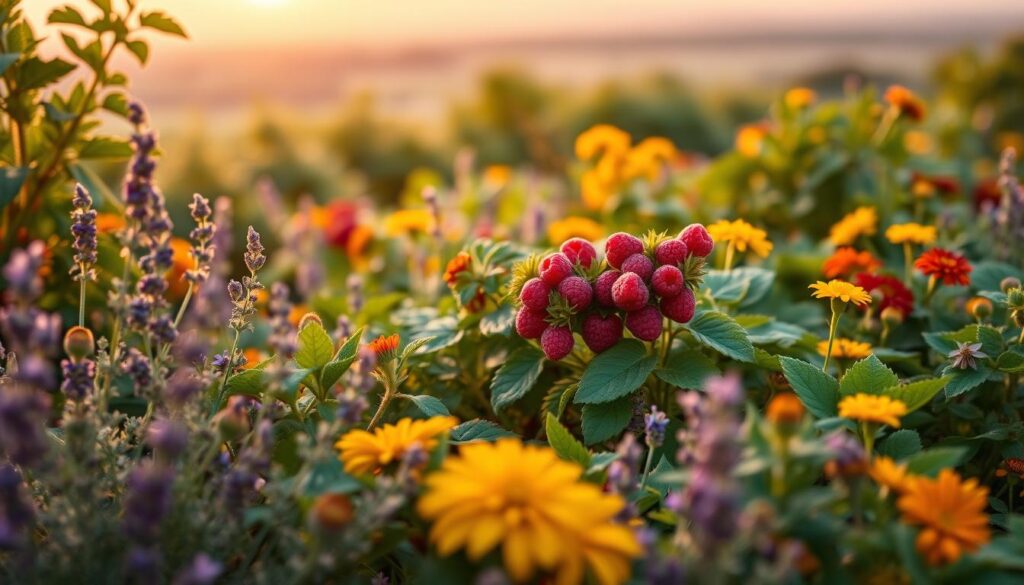
The Importance of Spacing in Companion Planting
Proper spacing plays a vital role in the success of your raspberry plant companions. When plants are overcrowded, they compete for essential resources such as nutrients and water. This competition not only hinders the growth of your raspberries but also affects the health of companion plants. Adequate spacing allows for better airflow, which helps reduce the risk of fungal diseases. By strategically placing companion plants, you can create a harmonious environment where both raspberries and their companions thrive.
Avoiding Overcrowding
Overcrowding can lead to a variety of issues, including stunted growth and increased susceptibility to pests. Maintaining adequate space between your raspberry canes and companion plants like marigolds and garlic promotes healthy development. Ensure that each plant has room to reach its full potential while sharing light and nutrients without hindrance.
Optimal Planting Distances
Finding the right distances for planting is crucial to creating a thriving garden. Marigolds should typically be spaced about 12 inches apart from raspberries to maximize their pest-repelling capabilities. Garlic, being a hardy companion, can thrive when planted around 8 inches from raspberry canes. When planting your raspberry plant companions, refer to the guidelines below for optimal distances:
| Companion Plant | Recommended Distance from Raspberries |
|---|---|
| Marigolds | 12 inches |
| Garlic | 8 inches |
| Basil | 10 inches |
| Chamomile | 9 inches |
With careful planning and attention to spacing, you can ensure a flourishing relationship between your raspberries and their plant companions. This thoughtful approach will optimize health and yield in your garden.
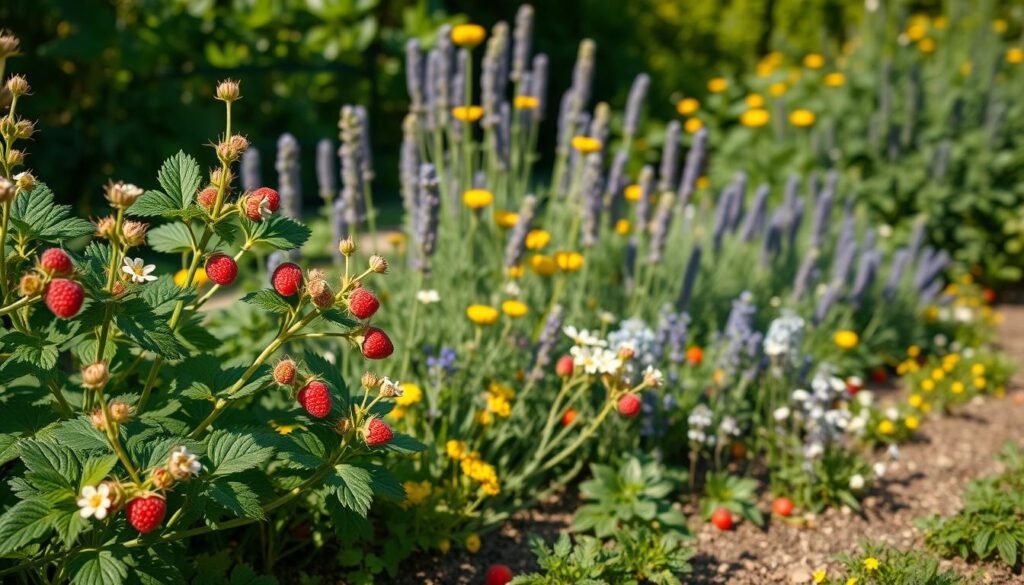
Pest Management Through Companion Planting
Using a raspberry companion planting guide can significantly impact pest management in your garden. Companion planting creates a biodiverse environment that helps control pests naturally. By strategically selecting specific plants, you can repel unwanted insects or attract natural predators that benefit your raspberry plants.
Natural Pest Control Methods
Plants like nasturtiums play a crucial role in pest management by luring aphids away from your raspberries. This diversion keeps your berries safe from these common pests. Additionally, planting garlic nearby can deter spider mites and other harmful insects, making it a great ally for your raspberry bushes.
Encouraging Beneficial Insects
Attracting beneficial insects is essential to a thriving raspberry garden. Plants such as yarrow not only draw in ladybugs, but they also support a healthy population of lacewings, which prey on garden pests. Incorporating a diverse range of companion plants will ensure a balanced ecosystem and promote the longevity of your raspberry plants.

Companion Planting Myths Debunked
As you delve into the world of companion planting with your raspberry garden buddies, it’s essential to navigate through the myths that can mislead even experienced gardeners. Many believe that simply planting certain flowers or herbs will lead to immediate benefits for neighboring plants. Understanding the science behind these interactions can transform your gardening approach.
Common Misconceptions
One prevalent myth is that all companion plants automatically enhance each other’s growth. This notion simplifies a complex system where various factors, including soil health, climate, and specific plant needs, play a pivotal role. Your raspberry garden buddies require a nuanced understanding of compatible plant relationships for optimal growth and productivity.
Real versus Perceived Benefits
While many companion plants offer genuine advantages, recognizing the difference between true benefits and perceived ones is vital. For instance, certain plants might help with pest control but may not significantly influence fruit flavor or size. Focusing on the real interactions between your raspberry garden buddies allows you to make more informed decisions and ultimately cultivate a thriving garden.
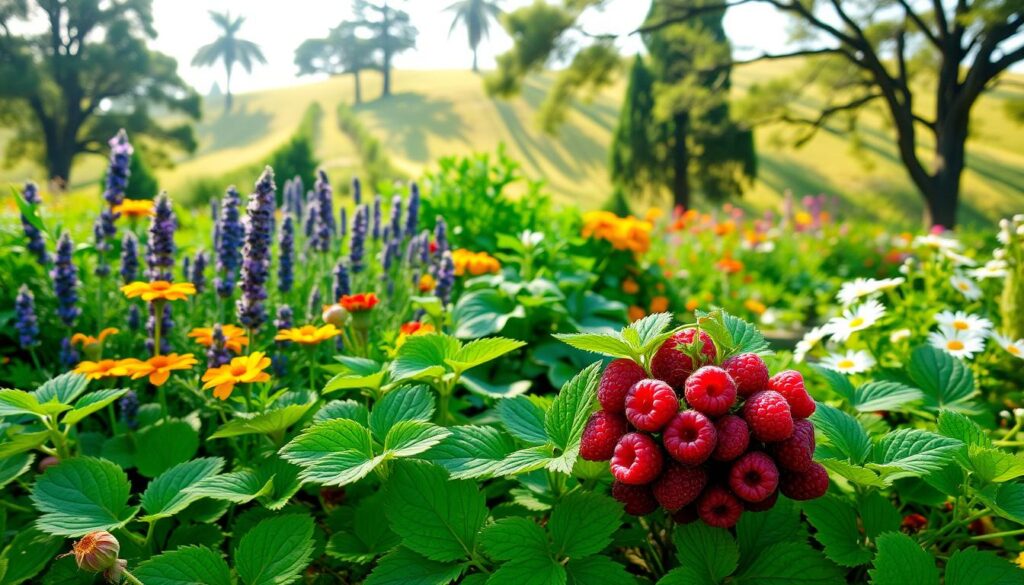
Harvesting Strategies with Companion Plants
Harvesting strategies play a crucial role in ensuring you get the best yield from your raspberry plants. Timing your raspberry harvest correctly can enhance flavor and sweetness. By considering the growth patterns of companion plants for raspberries, you can streamline the harvesting process. Different companions may mature at varying rates, making efficient management of your garden essential.
Timing Your Raspberry Harvest
Knowing the optimal time to pick your raspberries is vital. Ripe berries will appear plump and vibrant, giving off a strong fragrance. Harvest during cooler parts of the day to retain freshness. When you incorporate companion plants for raspberries, such as marigolds or basil, pay attention to their growth cycles. These plants often signal the right moment for raspberry gathering and can enhance the overall quality of your fruits.
Dealing with Multiple Harvests
With companion plants for raspberries, you may find yourself managing multiple harvests simultaneously. This can be a rewarding challenge, as it allows you to enjoy a diverse bounty from your garden. Plan your harvest schedule carefully. Keep track of when each companion plant matures to organize your picking. This approach not only maximizes efficiency but also contributes to a more enjoyable gardening experience.
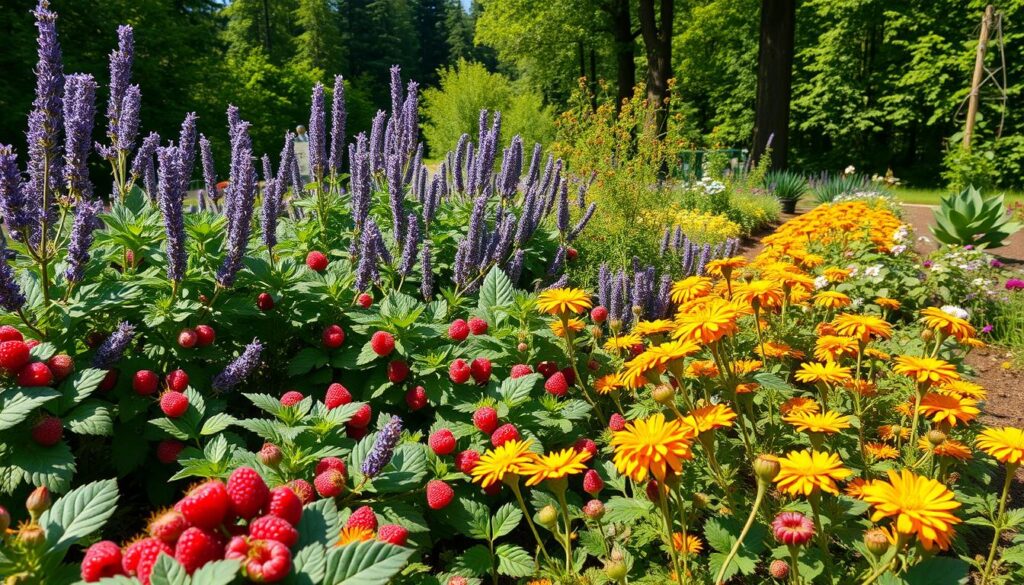
How to Monitor Plant Health
Monitoring the health of your raspberry plants and their companions is crucial for a thriving garden. With regular observation, you can identify signs of growth and flourishing companionship or take action if problems arise. Healthy raspberry plant companions will display vibrant colors, sturdy stems, and healthy fruit sets. On the other hand, signs of stress, such as wilting or color changes, often point to an imbalance that needs addressing.
Signs of a Successful Companion Plant Strategy
A successful strategy involves recognizing key indicators that your raspberry plant companions are working harmoniously. A well-functioning companion arrangement promotes not just the raspberry plants but also enhances the surrounding flora. Look for:
- Bright-green leaves that indicate vitality
- Consistent fruit production suggesting healthy pollination
- Minimal pest presence showcasing effective pest deterrents among companions
- Strong root systems fostering resilience
Troubleshooting Plant Issues
If you encounter difficulties, early detection is key to resolving any issues that may affect your raspberry plants. Common plant problems to watch for include:
- Wilting leaves, indicating insufficient water or nutrient deficiency
- Discoloration that may result from pests or disease
- Stunted growth suggesting poor soil health or inadequate sunlight
By maintaining vigilant observation, you can intervene promptly, ensuring your raspberry plant companions thrive together and remain productive throughout the growing season.
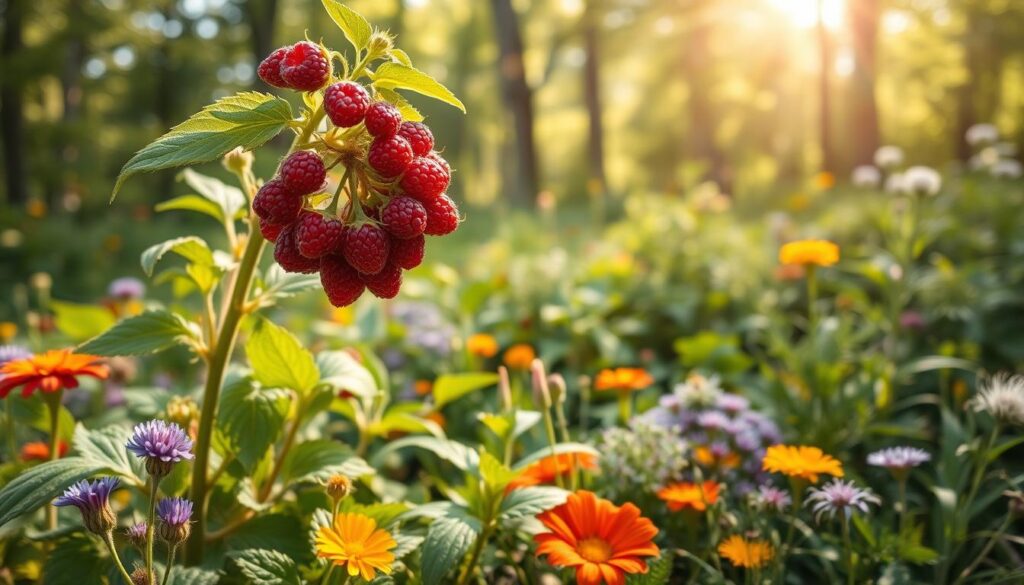
Final Tips for Companion Planting Success
When it comes to raspberry companion planting, your commitment to ongoing care can make all the difference in your gardening experience. Regular garden maintenance, such as ensuring adequate watering and timely fertilization, is crucial. Additionally, monitoring for pests and diseases will help you identify any issues before they impact your raspberry yield. Utilize this raspberry companion planting guide to create an environment where your plants can thrive alongside each other.
Keeping Up with Garden Care
Integrating the best plants to grow with raspberries into your garden can offer numerous benefits. As you cultivate your space, keep an eye on how different companions interact with your raspberries. If you notice particular plants enhancing growth or deterring pests, take note and adjust your planting strategies accordingly. Keeping a gardening journal can aid in tracking successes and challenges as you nurture your berry patch.
Continuous Learning and Experimentation
Gardening is a continuous journey of learning and experimentation. Each season, consider adding new companion plants to your raspberry garden. Observe how these newcomers influence the overall health and productivity of your raspberries. Embrace flexibility in your approach, as adapting to changes in your garden environment can lead to richer harvests and a more sustainable gardening practice.
